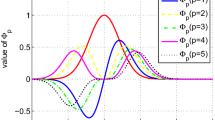Abstract
Adaptive channel equalization is a signal processing technique to mitigate inter-symbol interference in a time dispersive channel. For adaptive equalization, minimum mean square error (MMSE) criterion-based reproducing kernel Hilbert spaces (RKHS) approaches such as the kernel least mean squares (KLMS) algorithm and its variants have been suggested in the literature for nonlinear channels. Another optimality criterion, based on minimum bit/symbol error rate (MBER/MSER), is a better choice for adapting an equalizer as compared to MMSE criterion. A kernel-based minimum symbol error rate (KMSER) equalization algorithm combines minimum symbol error rate (MSER)-based approaches with RKHS techniques. However, most algorithms in RKHS such as KMSER/KLMS require infinite storage requirement and hence cannot be practically implemented. To curtail the infinite memory requirement, and make adaptive algorithm suitable for implementation with finite memory and processing power, we propose quantized KMSER (QKMSER) and fixed-budget quantized KMSER (FBQKMSER)-based equalizers in this paper. In this paper, we derive the dynamical equation for MSE evolution of the QKMSER and FBQKMSER and find their performance to be asymptotically close to the MSE behavior of the KMSER. Also, it is found via simulations that the tracking performance of FBQKMSER is better than all the compared algorithms in this paper which is particularly useful for non-stationary channels.






Similar content being viewed by others
References
Proakis, J.G.: Intersymbol Interference in Digital Communication Systems. Wiley (2003). doi:10.1002/0471219282.eot409
Jahromi, M.N.S., Salman, M.S., Hocanin, A., Kukrer, O.: Convergence analysis of the zero-attracting variable step-size LMS algorithm for sparse system identification. Signal Image Video Process. 9(6), 1353–1356 (2015)
Yeh, C.-C., Barry, J.R.: Adaptive minimum bit-error rate equalization for binary signaling. IEEE Trans. Commun. 48(7), 1226–1235 (2000)
Chen, S., Tan, S., Lei, X., Hanzo, L.: Adaptive minimum error-rate filtering design: a review. Signal Process. 88(7), 1671–1697 (2008)
Bhatia, V., Mulgrew, B., Georgiadis, A.T.: Stochastic gradient algorithms for equalisation in \(\alpha \)-stable noise. Signal Process. 86(4), 835–845 (2006)
Chen, H., Gong, Y., Hong, X., Chen, S.: Adaptive nonlinear equalizer using a mixture of Gaussian-based online density estimator. IEEE Trans. Veh. Technol. 63(9), 4265–4276 (2014)
Ma, W., Chen, B., Hua, Q., Zhao, J.: Sparse least mean p-power algorithms for channel estimation in the presence of impulsive noise. Signal Image Video Process. 10(3), 503–510 (2016)
Eweda, E., Zerguine, A.: New insights into the normalization of the least mean fourth algorithm. Signal Image Video Process. 7(2), 255–262 (2013)
Eweda, E., Bershad, N.J., Bermudez, J.C.M.: Stochastic analysis of the least mean fourth algorithm for non-stationary white gaussian inputs. Signal Image Video Process. 8(1), 133–142 (2014)
Gong, M., Chen, F., Hua, Y., Zhaohua, L., Liujun, H.: Normalized adaptive channel equalizer based on minimal symbol-error-rate. IEEE Trans. Commun. 61(4), 1374–1383 (2013)
Benedetto, S., Biglieri, E.: Nonlinear equalization of digital satellite channels. IEEE J. Sel. Areas Commun. 1(1), 57–62 (1983)
Stepniak, G., Siuzdak, J., Zwierko, P.: Compensation of a VLC phosphorescent white LED nonlinearity by means of Volterra DFE. IEEE Photon. Technol. Lett. 25(16), 1597–1600 (2013)
Ying, K., Yu, Z., Baxley, R.J., Zhou, G.T.: Nonlinear distortion mitigation in visible light communications. IEEE Wirel. Commun. 22(2), 36–45 (2015)
Banelli, P., Cacopardi, S.: Theoretical analysis and performance of OFDM signals in nonlinear AWGN channels. IEEE Trans. Commun. 48(3), 430–441 (2000)
Liu, W., Pokharel, P.P., Principe, J.C.: The kernel least-mean-square algorithm. IEEE Trans. Signal Process. 56(2), 543–554 (2008)
Liu, W., Pokharel, P.P., Principe, J.C.: Kernel affine projection algorithms. EURASIP J. Adv. Signal Process. 2008(1), 784292 (2008)
Engel, Y., Mannor, S., Meir, R.: The kernel recursive least-squares algorithm. IEEE Trans. Signal Process. 52(8), 2275–2285 (2004)
Chen, B., Zhao, S., Zhu, P., Principe, J.C.: Quantized kernel least mean square algorithm. IEEE Trans. Neural Netw. Learn. Syst. 23(1), 22–32 (2012)
Zhao, S., Chen, B., Zhu, P., Príncipe, J.C.: Fixed budget quantized kernel least-mean-square algorithm. Signal Process. 93(9), 2759–2770 (2013)
Schölkopf, B., Smola, A.J.: Learning with Kernels: Support Vector Machines, Regularization, Optimization, and Beyond. MIT press, Cambridge (2002)
Bouboulis, P., Theodoridis, S.: Extension of Wirtinger’s calculus to reproducing kernel Hilbert spaces and the complex kernel LMS. IEEE Trans. Signal Process. 59(3), 964–978 (2011)
Bouboulis, P., Theodoridis, S., Mavroforakis, M.: The augmented complex kernel LMS. IEEE Trans. Signal Process. 60(9), 4962–4967 (2012)
Parreira, W.D., Bermudez, J.C.M., Richard, C., Tourneret, J.-Y.: Stochastic behavior analysis of the Gaussian kernel least-mean-square algorithm. IEEE Trans. Signal Process. 60(5), 2208–2222 (2012)
Mitra, R., Bhatia, V.: A kernel based technique for MSER equalisation for non-linear channels. In: EUSIPCO 2015, pp. 1461–1465 (2015)
Mitra, R., Bhatia, V.: Adaptive sparse dictionary based kernel minimum symbol error rate post-distortion for nonlinear LEDs in visible light communications. IEEE Photon. J. 8(4), 472–484 (2016)
Chen, B., Zhao, S., Zhu, P., Principe, J.C.: Quantized kernel recursive least squares algorithm. IEEE Trans. Neural Netw. Learn. Syst. 24(9), 1484–1491 (2013)
Silverman, B.W.: Density Estimation for Statistics and Data Analysis. CRC Press, Boca Raton (1986)
Chen, B., Liang, J., Zheng, N., Príncipe, J.C.: Kernel least mean square with adaptive kernel size. Neurocomputing 191, 95–106 (2016)
Bhatia, V., Mulgrew, B.: Non-parametric likelihood based channel estimator for Gaussian mixture noise. Signal Process. 87(11), 2569–2586 (2007)
Miramirkhani, F., Uysal, M.: Channel modeling and characterization for visible light communications. IEEE Photon. J. 7(6), 1–16 (2015)
Elgala, H., Mesleh, R., Haas, H.: An LED model for intensity-modulated optical communication systems. IEEE Photon. Technol. Lett. 22(11), 835–837 (2010)
Author information
Authors and Affiliations
Corresponding author
Rights and permissions
About this article
Cite this article
Mitra, R., Bhatia, V. Finite dictionary techniques for MSER equalization in RKHS. SIViP 11, 849–856 (2017). https://doi.org/10.1007/s11760-016-1031-1
Received:
Revised:
Accepted:
Published:
Issue Date:
DOI: https://doi.org/10.1007/s11760-016-1031-1




